
Jim & Ingrid Croce is the second studio album by American singer-songwriter Jim Croce, the only one performed as a duo with his wife Ingrid. It was originally released in 1969 and has been subsequently re-released with alternate titles such as Bombs over Puerto Rico, Another Day, Another Town and Approaching Day.
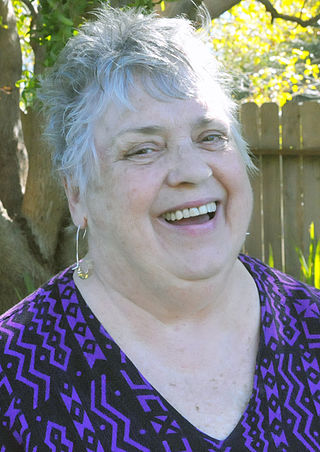
Elaine "Spanky" McFarlane is an American singer best known for fronting the vocal group Spanky and Our Gang in the late 1960s. She was nicknamed "The Queen of Sunshine Pop".
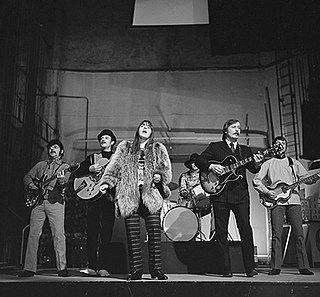
Spanky and Our Gang was an American 1960s sunshine pop band led by Elaine "Spanky" McFarlane. The band derives its name from Hal Roach's Our Gang comedies of the 1930s, because of the similarity of McFarlane's surname with that of George McFarland (Spanky). The group was known for its vocal harmonies and had major hits in the US and Canada in 1967–1968 with "Sunday Will Never Be the Same," "Lazy Day," "Sunday Mornin'," and "Like to Get to Know You."

Robert Lrod Dorough was an American bebop and cool jazz vocalist, pianist, composer, songwriter, arranger, and producer. Dorough became famous as the composer and performer of songs in the TV series Schoolhouse Rock!, as well as for his work with Miles Davis, Blossom Dearie, and others.
Terry Cashman is an American record producer and singer-songwriter, best known for his 1981 hit, "Talkin' Baseball". While the song is well recognized today and allowed Cashman the chance to meet the featured players, it was all but ignored by typical Top 40 radio during its chart life, making only the Billboard Adult Contemporary chart.

The Chevrons were a United States pop group who recorded the hit record "Lullabye" in 1960. The band featured lead singer Terry Cashman, best known for his baseball songs, notably "Talkin' Baseball", then known by his born name, Dennis Minogue. The group disbanded when John "Marty" Trautman, co-founder of the group, was drafted by the U.S. Army on December 11, 1962.
The Overlanders were a British music group active during the 1960s.
Stuart Martin Scharf was an American composer, guitarist, and record producer.

"Gee" is a song by American R&B and Doo-wop group the Crows, released in June 1953. The song has been credited as the first rock and roll hit by a rock and roll group. It is a doo-wop song, written by William Davis and Viola Watkins, and recorded by the Crows on the independent label, Rama Records, at Beltone Studios in New York City in February 1953. It charted in April 1954, one year later. It took a year to get recognized on Your Hit Parade. It landed No.2 on the rhythm and blues chart and No. 14 on the pop chart. It was the first 1950s doo-wop record to sell over one million records. Recorded on an independent label, it was one of the first such R&B records to crossover to the wider pop market. In fact, some, including Jay Warner, consider it as the first of the "rock n' roll records".
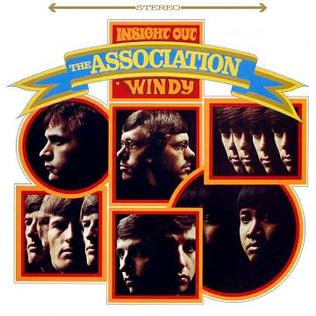
Insight Out is the third album by the American pop band the Association and was released on June 8, 1967 on Warner Bros. Records. It was the band's first album release for the Warner Brothers label and it became one of the top selling LPs of the year in America, peaking at number 8 on the Billboard Top LPs chart and being certified gold by the Recording Industry Association of America. Critic Richie Unterberger has attributed much of the album's success to the inclusion of the U.S. hits "Windy" and "Never My Love", which reached number 1 and number 2 on the Billboard Hot 100 chart respectively and were among the most-played records on AM radio during the late 1960s.
Thomas Picardo Jr., known professionally as Tommy West, was an American record producer and singer-songwriter.
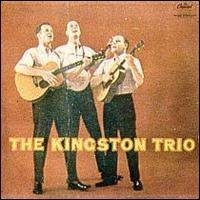
The Kingston Trio is the Kingston Trio's debut album, released in 1958. It entered the album charts in late October 1958, where it resided for nearly four years, spending one week at #1 in early 1959. It was awarded an RIAA gold album on January 19, 1961.
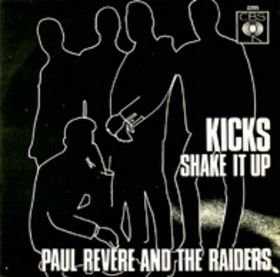
"Kicks" is a song composed by Barry Mann and Cynthia Weil, best known as a 1966 hit for American rock band Paul Revere & the Raiders.
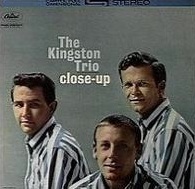
Close-Up is the eleventh album by the American folk music group the Kingston Trio, released in 1961. It was the first release by the group after the departure of founding member Dave Guard. The Trio now consisted of Bob Shane, Nick Reynolds and Guard's replacement John Stewart. Close-Up peaked at number three on the Billboard charts. The lead-off single was "Coming from the Mountains" backed with a non-LP track, "Nothing More to Look Forward To". Close-Up was nominated for a Grammy award in 1961 for Best Performance by a Vocal Group.

New Frontier is an album by the American folk music group the Kingston Trio, their third album released in 1962. It reached number 16 on the Billboard Pop Albums chart. The lead-off single was "Greenback Dollar" b/w "New Frontier".
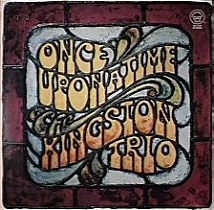
Once Upon a Time is a live album by the American folk music group the Kingston Trio, recorded in 1966 and released in 1969. It was originally released as a double-LP with a three-page booklet and reached number 163 on the Billboard Pop Albums chart. The lead-off single was "One Too Many Mornings" b/w "Scotch and Soda".

Like to Get to Know You is the second studio album by Spanky and Our Gang, released in 1968. It is the first of their albums to exhibit their signature sound, partially owing to it being produced by two different people than their debut album.

"Lazy Day" is a song written by Tony Powers (lyrics) and George Fischoff (music), and recorded by the 1960s band Spanky and Our Gang. It appeared on their album Spanky and Our Gang.

Nigel Pickering was an American folk rock musician, who co-founded and was a songwriter for Spanky And Our Gang.
"Sunday Will Never Be the Same" is a 1967 song by the American band Spanky and Our Gang from their self-titled debut album. The single peaked at #9 on the Billboard Hot 100 and #7 in the Canadian RPM Magazine charts. The song was written by Terry Cashman and Gene Pistilli and borrows an interlude from the French carol “Les Anges Dans Nos Campagnes”. The arrangement is by Jimmy Wisner.














